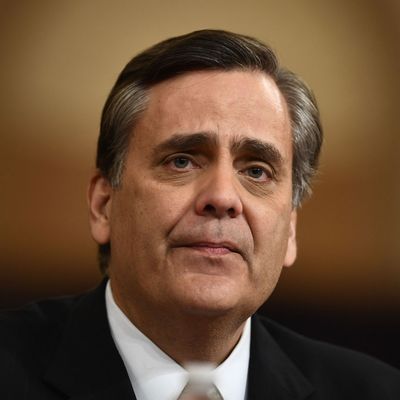
Three of the four distinguished constitutional law professors appearing during today’s House Judiciary Committee hearing on impeachment were called by the majority Democrats, and unsurprisingly they agreed that the president’s behavior toward Ukraine, Congress, and his own Justice Department represented textbook grounds for impeachment. They expressed no real reservations about those conclusions.
Judiciary Republicans got to call one witness, and presumably they could not find a constitutional authority who shared the president’s often-repeated belief that he can do any damn thing he wants, or even one who was open to the conspiracy theories so many of them promote, or to their depiction of Trump as a brave patriot fighting corruption at home and abroad and suffering persecution for his virtue. But they found the next best thing: George Washington University’s Jonathan Turley, an outspokenly non-partisan and Trump-skeptic expert who nonetheless in every significant particular reinforced their claim that Trump’s being railroaded toward impeachment via a hasty partisan effort based on evidence falling far short of constitutional standards for removing a president.
In his opening remarks Turley made it clear he had voted against Donald Trump in 2016, and in defending him against impeachment he made a telling comparison of POTUS to Satan via a long account of St. Thomas More’s defense of giving the devil the benefit of the law from the fictional drama A Man for All Seasons. In both his prepared remarks and in answering questions he positioned himself as someone who deplored the partisan passions of the day, while sadly concluding that the impeachment effort — and the Republican battle against it — was just another example of a nation gone mad.
In other words, Turley was the perfect witness to appeal to self-styled political independents and putative 2020 swing voters who might approach this entire controversy with a plague-on-both-your-houses attitude. He wisely fell silent when Republican questioners retailed their own conspiracy theories about Hunter Biden or other nefarious Democrats.
Now if you read or listened to his words closely, it became apparent he differed from the other witnesses — and from the weight of opinion in constitutional law circles — not just on Trump’s impeachment but on all sort of fundamental issues. Unlike the others, he thinks presidents cannot obstruct Congress — or even obstruct justice — unless they defy judicial orders (unfortunately, federal judges typically refuse to police executive-legislative disputes, particularly those involving impeachment, as “political questions”). Unlike the others, he believes the constitutional standards for “bribery” track later criminal statutory definitions. And unlike the others, he would limit impeachments to situations where such criminal statutes are violated.
He also made it reasonably clear that he felt Bill Clinton was properly impeached, and that Andrew Johnson was “railroaded” much like Trump; Nixon, he feels, deserved impeachment but not on the obstruction of justice grounds that might provide a precedent for impeaching Trump. And above all, he stressed that legitimate and politically-sustainable impeachments require a lot of time (“saturation and maturation,” as he put it). As of this writing, he hasn’t addressed the question of how an alleged effort to rig an impending election can be addressed at the requisite leisurely pace, but Turley is clearly on board with the bedrock GOP argument that this impeachment proceeding is by definition illegitimate because it is happening so quickly.
So he is in an excellent position to give “non-partisan” credibility to the intensely partisan — by his own accounting — Republicans he is materially assisting. He reminds me a lot of David Brooks and other center-right pundits who profess disdain for partisans — equal disdain, regardless of the facts in any particular case — but who happen more often than not to come down on the side of whatever the GOP wants at any given moment.
Anyone seduced by Turley’s reasonable manner and apparent passion for fairness should reflect on the fact that he considers Andrew Johnson — the autocratic racist who tried to reverse the gains in human rights secured by the bloody sacrifices of the Civil War — a great victim of congressional abuse of power, and an appropriate role model for Trump as the object of an illegitimate impeachment inquiry. In his comparison of the 17th and 45th presidents he finally makes a point with which we can all agree.






























